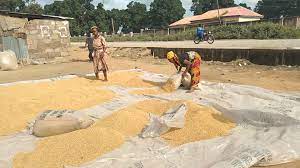Business
SON Cautions Borno Rice Millers Against Sharp Practice

The Coordinator of Standard Organisation of Nigeria (SON), Borno, Mr Adamu Ahmed, has cautioned rice processing companies in the state against sharp practice to maximise profit.
Ahmed, who spoke to journalists yesterday in Maiduguri, said the call became necessary following complaints by consumers that locally produced rice in 10, 25 and 50 kg bags were short of the actual weight specifications.
Ahmed said such sharp practice noticed by consumers in contents of assorted grains was unacceptable, adding that SON would soon clampdown on defaulting manufacturers and dealers of such products.
“Consumers should come to SON to complain whenever they observe such things or sub standard products.
“In doing that, they have helped the manufacturer to improve his product and other consumers to combat bad products.
“There is standard for rice, if you are processing rice. Come to SON to get the standard and make sure your product meets the required standard,” the coordinator said.
Many consumers who spoke to journalists in Maiduguri have raised concern about the poor packaging of local rice.
A civil servant, Abubakar Musa, said, “You will notice that the rice is full of stones and husks while the weight is not commensurate with the kilogrammes written on the bag.
“You will see a 10kg bag weighing 8kg, 20kg weighing 18kg, and sometimes a 50kg bag weighing 40kg! This is cheating.”
A university student, Halima Lawan,urged relevant authorities like SON to start a campaign against the malpractice.
“We need to have an aggressive campaign against sharp practice; it’s not fair for consumers to be buying things at exorbitant costs while the content does not meet the weight specification,” Lawan said.
A trader, Bukar Usman, observed that while few shop owners, particularly dealers were responsible for reducing the contents of grains, in most cases the reduction was done by the manufacturers.
“We are also not happy with that. Many contractors supplying local rice to organisations feeding displaced persons in camps used to complain that many bags of rice were rejected because the weight was less than the kilogrammes written on the bags,” Usman said.
Business
Fidelity Bank To Empower Women With Sustainable Entrepreneurship Skills, HAP2.0
Business
President Tinubu Approves Extension Ban On Raw Shea Nut Export
Business
Crisis Response: EU-project Delivers New Vet. Clinic To Katsina Govt.
-

 News2 days ago
News2 days agoAmend Constitution To Accommodate State Police, Tinubu Tells Senators
-

 Politics2 days ago
Politics2 days agoSenate Urges Tinubu To Sack CAC Boss
-

 News2 days ago
News2 days agoDisu Takes Over As New IGP …Declares Total War On Corruption, Impunity
-
Business2 days ago
President Tinubu Extends Raw Shea Nuts Export Ban To 2027
-
Business2 days ago
Crisis Response: EU-project Delivers New Vet. Clinic To Katsina Govt.
-
Business2 days ago
President Tinubu Approves Extension Ban On Raw Shea Nut Export
-
Sports2 days ago
NDG: Rivers Coach Appeal To NDDC In Talent Discovery
-
Rivers2 days ago
Etche Clan Urges Govt On Chieftaincy Recognition

